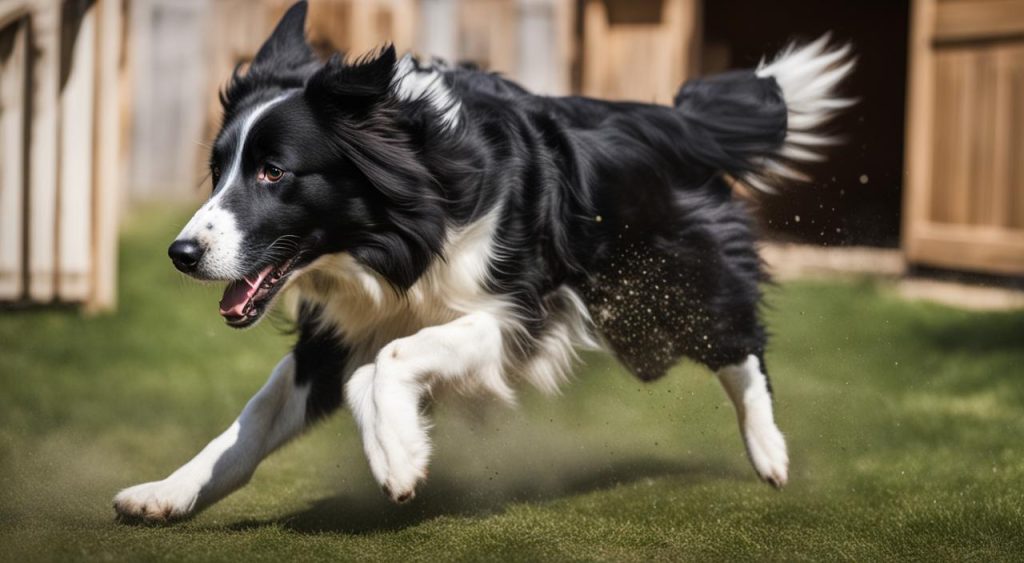Border Collies are intelligent and trainable dogs, but they can be a handful if not handled correctly. It is crucial to understand the common mistakes and pitfalls that owners often make when it comes to training and caring for Border Collies. By avoiding these errors, you can ensure a harmonious relationship with your Border Collie and prevent behavior problems that may arise from misguided practices.
Neglecting their exercise needs is one of the most significant mistakes to avoid. Border Collies are highly energetic dogs that require plenty of physical activity to stay happy and healthy. Failing to provide them with enough exercise can lead to frustration and the development of destructive behaviors.
Another don’t is confining Border Collies for extended periods. These dogs thrive on mental and physical stimulation and can become restless and anxious when left alone or confined for too long. It is essential to offer them a variety of activities and ensure they have enough space to move around and explore.
Additionally, it is vital to steer clear of physical punishment or forceful training methods. Border Collies respond best to positive reinforcement techniques and can become anxious or aggressive if subjected to harsh treatment. Building trust and a strong bond through gentle guidance and rewards is key to their successful training.
Last but not least, neglecting their need for mental stimulation and tasks should also be avoided. Border Collies are highly intelligent and require mental challenges to be satisfied. Leaving them bored or without proper mental stimulation can lead to behavioral problems.
Key Takeaways:
- Provide ample exercise to prevent frustration and destructive behavior.
- Avoid confining Border Collies for long periods; offer a variety of activities.
- Use positive reinforcement; avoid physical punishment or forceful training methods.
- Ensure mental stimulation to prevent boredom and behavior problems.
- Build trust and a strong bond through gentle guidance and rewards.
Common Behavior Problems in Border Collies
Border Collies are known for their intelligence and agility, but they can also be prone to certain behavior problems. Understanding these issues can help you address and prevent them effectively.
Separation Anxiety
One common behavior problem in Border Collies is separation anxiety. These dogs form strong bonds with their owners and can become overly dependent. When left alone, they may exhibit signs of distress, such as excessive barking, destructive behavior, or house soiling. Providing them with proper boundaries and gradually acclimating them to being alone can help alleviate separation anxiety.
Protection Issues
Border Collies have a strong protective instinct, and if they perceive their owner as weak or vulnerable, they may exhibit protective behaviors. This can include growling, barking, or even aggression towards strangers. Establishing yourself as the pack leader through consistent training and socialization can help prevent protection issues in Border Collies.
Dominance Issues
Border Collies are highly intelligent and can sometimes develop dominance issues if they are allowed privileges that make them think they are superior to their owners. This can manifest as refusal to obey commands, resource guarding, or challenging behaviors. Setting clear boundaries and practicing consistent, firm leadership will help address dominance issues in Border Collies.
Chasing Issues
Border Collies have a natural herding instinct, which can translate into chasing behaviors. They may chase after cars, bikes, or even small animals. This can put them in dangerous situations and lead to accidents. Teaching them an alternate behavior, such as a reliable recall or a “leave it” command, can help control their chasing instincts.
Noise Sensitivity
Many Border Collies are sensitive to certain sounds, especially deep bass sounds. They may exhibit fear or anxiety in response to loud noises, which can lead to increased stress levels. Gradual desensitization and counter-conditioning techniques can help Border Collies overcome their noise sensitivity and become more comfortable in loud environments.
Poor Socialization
Poor socialization, particularly in Border Collies from puppy farms or limited human contact, can lead to various behavioral issues. They may display fear or aggression towards unfamiliar people, dogs, or new environments. Proper socialization from an early age and exposing them to a variety of positive experiences can help prevent poor socialization issues in Border Collies.
By understanding and addressing these common behavior problems, you can ensure that your Border Collie is a well-behaved and happy companion.
How to Train and Reprimand Border Collies Effectively
When it comes to training and reprimanding your Border Collie, a positive reinforcement approach is the most effective method. Instead of resorting to physical punishment, opt for using a firm voice and redirecting their behavior towards something acceptable. This approach helps build trust and strengthens the bond between you and your Border Collie.
When reprimanding your Border Collie, timing is crucial. Address the undesired behavior immediately and keep your reprimand simple and clear. This will help your dog understand what they did wrong and how to correct it. On the other hand, praising and rewarding good behavior promptly reinforces the desired response, creating a positive learning experience for your Border Collie.
Consistency and clarity are key factors in effective Border Collie training. Use the same commands and cues consistently so that your dog can understand and obey them. This helps prevent confusion and encourages obedience. Also, it’s important to ensure that the reprimand aligns with the specific behavior, avoiding excessive punishment that can harm the trust between you and your Border Collie.
Withholding rewards can also be a powerful tool in training your Border Collie. By only rewarding your dog when they exhibit the desired behavior, you reinforce the notion that good behavior is rewarded and encouraged. This motivates your Border Collie to continue behaving in the desired manner.
When training your Border Collie, be patient and consistent. Remember, building trust and strengthening the bond is crucial. Positive reinforcement, combined with consistency and clarity, will help transform your Border Collie into a well-behaved and obedient companion.
Conclusion
In conclusion, proper training and care are essential for the well-being of Border Collies. Neglecting their exercise needs, using physical punishment, leaving them alone for extended periods, and neglecting mental stimulation can lead to behavior problems and a decreased quality of life. To ensure their happiness and health, it is crucial to prioritize their exercise routine, engage in positive reinforcement training methods, and provide proper socialization.
By avoiding common mistakes and following the guidelines for Border Collie training and care, you can create a loving and harmonious relationship with your furry companion. Border Collies are intelligent and active dogs, and with the right approach, they can excel in various activities and tasks. Remember to prioritize their physical and mental well-being to enjoy a happy and fulfilling life together.
In summary, do not neglect the exercise needs of your Border Collie, avoid using physical punishment, don’t leave them alone for extended periods, and provide ample mental stimulation. By adhering to these principles and giving them the care they require, you can ensure that your Border Collie thrives, and together you can create beautiful memories and experiences.





